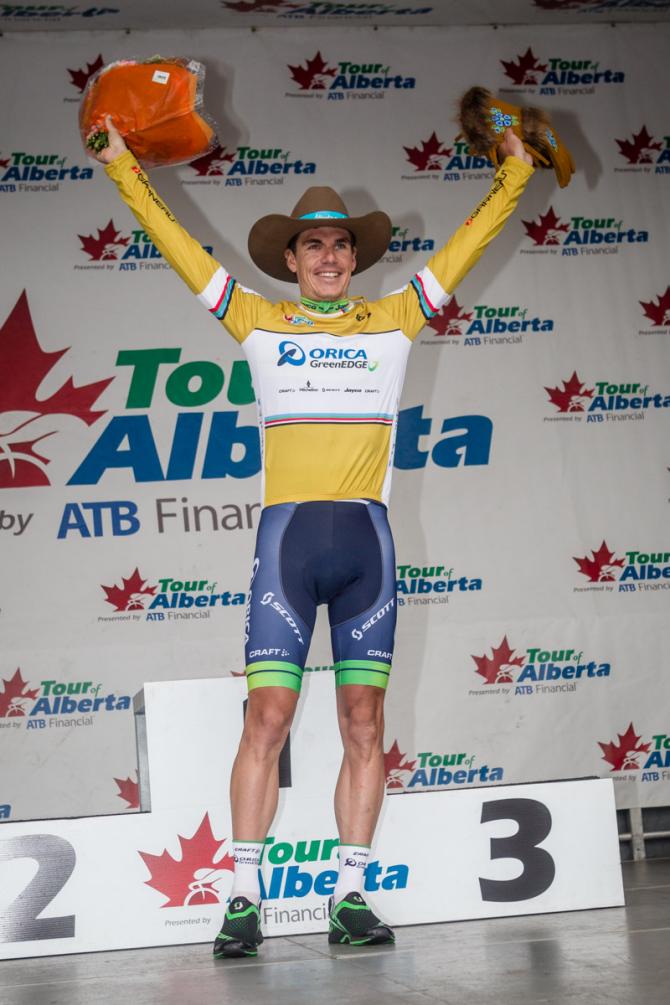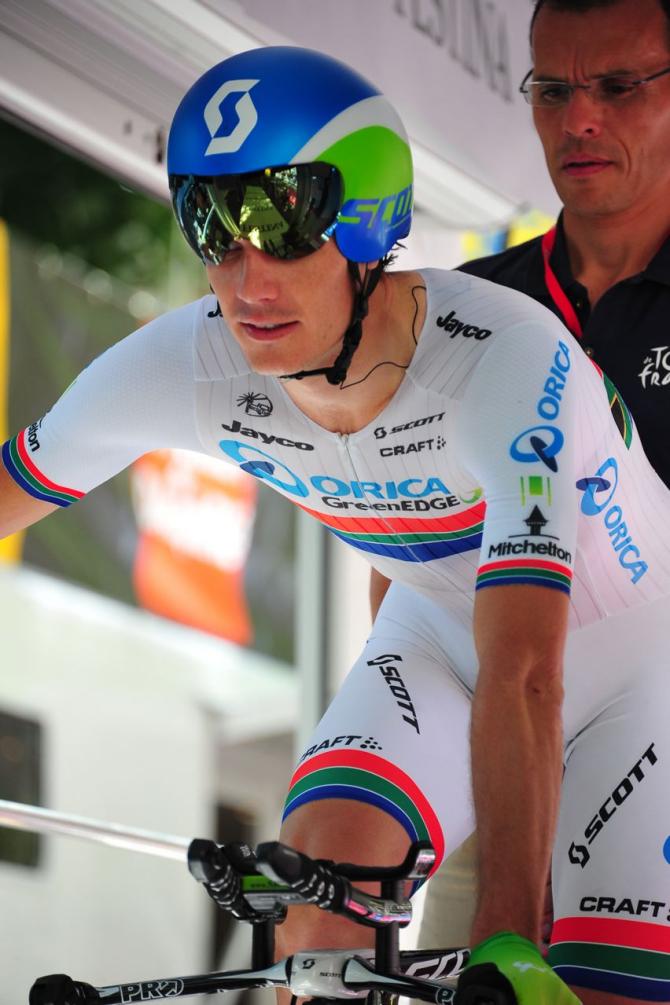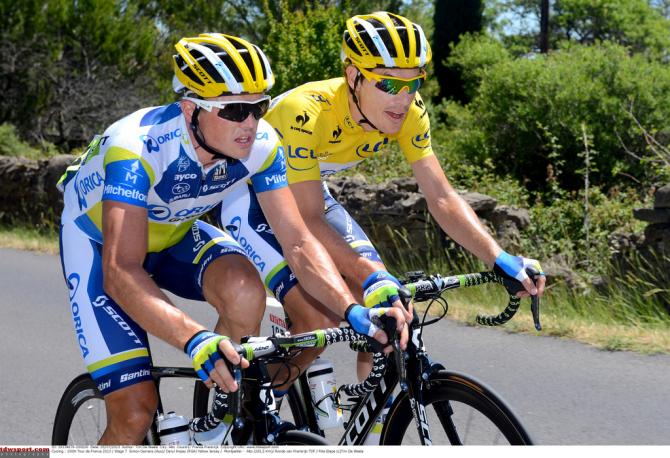Impey heads to Worlds after proving innocence of doping
South African's comeback in Canada "a dream"



In June, Daryl Impey was on flying form, coming off a stage win in the Bayern Rundfahrt and looking forward to the Tour de France, where he would wear the jersey of the South African time trial champion, and maybe - if everything went right - once again wear the yellow jersey, which he had done the year before. Fast forward to September and Impey is back on form, but climbing out of a gaping hole in his palmares, now exonerated from a positive doping test which took over six months to resolve.
Impey returned to competition at the Tour of Alberta, winning the overall by a single second on the final stage in Edmonton, then took on the two WorldTour races, the GP Quebec and Montreal, where he helped Orica-Greenedge teammate Simon Gerrans to back-to-back victories. He spoke to Cyclingnews about his return from the doping ordeal, which started after a sample taken during the South African championships tested positive for traces of a banned drug, probenecid, and ended after he proved to the authorities that the result was due to cross-contamination in a South African pharmacy.
"It's a relief to have it all settled, and prove my innocence. That was the major fight. To finally come back and race, and be with the guys again, and for it to go so well - winning Alberta, getting fourth [in Quebec] with Simon winning - it's been a dream come-back," Impey said.
It was difficult for Impey, who turns 30 in December, to stay motivated to train while staring down the barrel of a doping ban, but a firm belief in his innocence and his ability to prove it helped him stay on track.
"I was getting ready for the Tour when I was notified, so I was pretty fit by the time I got home, and just kept training really hard. The team was really backing me, saying that if things went well, I'd still continue with the team. I always had that at the back of my mind, so it was the light at the end of the tunnel."
Prior to the election of Brian Cookson as UCI president, very few riders were ever exonerated for doping. Even if they were, like Alberto Contador was by the Spanish authorities after he'd tested positive for minute traces of Clenbuterol at the 2010 Tour de France, which he attributed to contaminated meat, the UCI had a habit of appealing the decisions to the Court of Arbitration for Sport (CAS), which invariably decided against the athlete. Since last September, both Impey and Australian Michael Rogers were exonerated for contamination-level positives.
"Mine was definitely a contamination amount," he said. "We proved the theory, we had experts to prove everything. We had affidavits, and every bit of proof we needed. We convinced [the South African Institute For Drug Free Sport, or SAIDS] that it was beyond reasonable doubt this happened."
Get The Leadout Newsletter
The latest race content, interviews, features, reviews and expert buying guides, direct to your inbox!
Impey's attorneys - a team of three plus two anti-doping experts - were able to establish that a pharmacist (whose name was not made public) dispensed probenecid two hours before selling Impey empty gel capsules, which they then argued were contaminated with the drug, resulting in his positive test.
"You have to prove where these things come from," Impey said. "I was able to prove it. I was fortunate I could back-trace it. But truth be told, five months later, I was lucky I had all these records to actually prove my innocence."
Impey had packed the capsules with sodium bicarbonate, which athletes use to buffer the lactic acid that can slow them down. He said there are no commercial products like it in South Africa, which is why he was making his own.
"It wasn't about me trying to be my own scientist. It was just to hide the taste. If you've ever put a bit of bicarbonate in water and drunk it, you'd say the same thing. Every single cyclist I know, every athlete I know, does this, it's a common practice. I wasn't doing anything illegal."
Going to Worlds
Even though the South African cycling federation gave little support to Impey during his case, they still selected him for one of the team's three places for the UCI Road World Championships in Ponferrada, and he accepted, but Impey isn't sure he has the form to compete against a peloton that has been racing full out while he has been on the bench for two months.
"It's a course that suits me, but I haven't had much racing. There are guys who are coming off the Vuelta, and I had these two races to prepare. It's a long shot. I'd have to have everything going my way and it's quite hard with a team of only three guys.
"I think at the moment I'm just riding on pure morale rather than form. The numbers I'm doing at the moment aren't incredible, but I think I have such a fresh mind, and I just wanted to prove myself again. That's what's keeping me going."
The federation is now looking into why it took months for SAIDS to inform Impey of his positive test, a delay which cost him the opportunity to race in the Tour de France, and put his reputation into doubt.
"It's a harsh system, but it's a system that needs to be there in place for cheats. I get both sides. Obviously when you're sitting on the side where you haven't done something, you hope the system works in the way it has for me. Being innocent, I couldn't see it going any other way. Actually, I was glad that I could give them all the facts.
"People are always quick to say 'he got let off'. First they levelled me as a doper, then afterwards when I proved my innocence they say 'he got let off', but that's the wrong way around. I was innocent at the start. Like I always said, I'm happy these systems work, and they were able to find such a small amount [of the drug], but there's also sometimes things happen that are out of your control, like in my case. I was just happy to be able to solve it. If you can't solve it, you're looking at a ban you shouldn't even have been serving."
Impey thinks his defence will stand up, and does not expect the UCI to appeal.
"I've got all the evidence. I'm not really worried about people back-checking. I have all the facts. I know people think it's weird circumstances, - and it is weird circumstances - and it's something that happened. No one can say it didn't happen. I have the proof. This is not a made-up story. I don't know if the UCI have all the information or not, but I know that I haven't done it, and I've proved myself.
"I don't think the UCI will appeal. Once they have gotten the brief, they might. The facts are the facts. You can't hide them. It's not a swaying of the vote or trying to convince people this happened. I'm really not worried."

Laura Weislo has been with Cyclingnews since 2006 after making a switch from a career in science. As Managing Editor, she coordinates coverage for North American events and global news. As former elite-level road racer who dabbled in cyclo-cross and track, Laura has a passion for all three disciplines. When not working she likes to go camping and explore lesser traveled roads, paths and gravel tracks. Laura specialises in covering doping, anti-doping, UCI governance and performing data analysis.